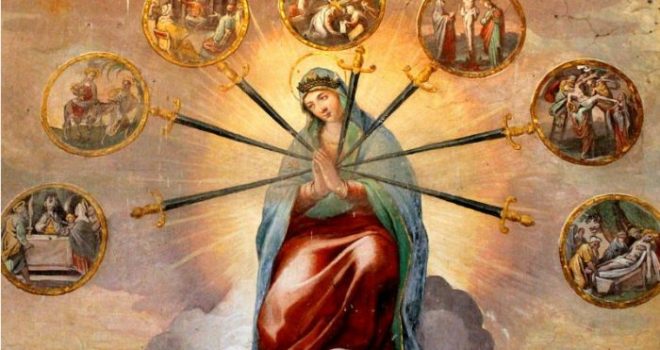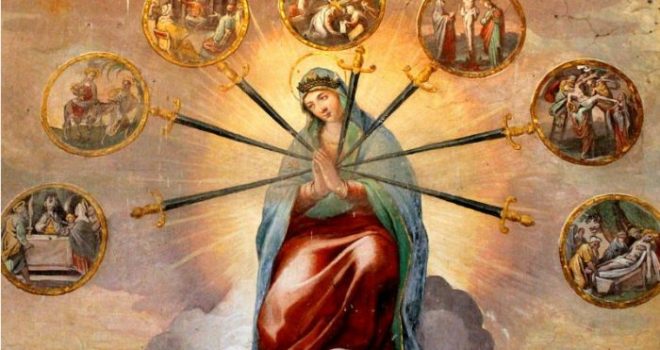The personal benefits of praying the Rosary are undeniable. We ask Our Lady to pray for us and receive grace to handle the ups and downs of that day.
We mediate on events from the earthly life of Christ and endeavor to imitate Him in thought, word, and deed. Over time, if we do this with reverence and consistency, we will be more conformed to His image.
Concern about our sanctification is central to the orthodox Catholic’s life. As Charles Peguy said, “There is only one tragedy in the end: Not to have become a saint.”
However, about two years ago, I felt a distinct leading of the Spirit to have a greater emphasis on devotions that were not about me at all, where no personal benefit was at the forefront of my motivation.
For example, you can pray and meditate before the Blessed Sacrament and do nothing but offer Christ thanksgiving for all the blessings we have on earth and in the heavenly places (Eph. 1:3). Try doing this sometime without offering any petitions or seeking any physical or spiritual benefit for yourself.
It’s important to note that many of the great masters of Christian spirituality (e,g, St. John of the Cross, Teresa of Avila) contend that, as we ascend higher and higher in the spiritual life towards heaven, we tend to forget about ourselves and do all things for God’s glory. Christ’s pleasure becomes our greatest reward.
An excellent devotion for tempering too much self-focus in our spirituality is the Chaplet of the Seven Sorrows. It facilitates a salutary other-centeredness that draws our attention away from ourselves and onto the Blessed Virgin’s earthly affliction.
Its origin is ancient and many customs have developed around it in order to plumb the depths of Mary’s heart that was pierced so that “thoughts out of many hearts may be revealed” (Lk. 2:35). One of the more well-known customs began with the Servite order in 1233 who developed the Servite Rosary in order to meditate on the Blessed Virgin’s grief through seven pivotal events in her life.
Mary’s sorrows during the Passion become especially acute and relevant. The Passion truly was, as Christ described it to St. Faustina, “an ocean of bitterness”, both for Mother and Son.
To love is to suffer and to love greatly is to suffer greatly. A mother who is extremely self-centered, immature, and neglectful may not care much if her son is mercilessly bullied at school. An exemplary mother suffers greatly because of it and moves with haste to take the necessary steps to make it stop.
Our Lady had more maternal love than all the exemplary mothers who ever lived combined so her suffering can be best described as incomprehensible. Her unparalleled capacity for love, among all of God’s creation, also gave her an unparalleled capacity for suffering.
This ocean of bitterness gets even deeper when we consider the Object of Mary’s perfect love, Jesus Christ, who was infinitely more worthy of love, honor, praise, and glory than all the saints who ever lived combined.
Yes, he possessed all the virtues, but, more accurately, was the Well-Spring of all virtue. He didn’t so much have goodness, beauty, and truth as he was/is Goodness, Beauty, and Truth.
The cruelest torture was perpetrated on the most innocent victim. The pain was undoubtedly and unimaginably compounded because Our Lady saw both her Son and God tortured to death.
This grave injustice was seen far more clearly by Mary who had a mind that had never been darkened by sin (Eph. 4:18) and a heart that never failed to “do justice, and to love kindness, and to walk humbly with your God” (Mic. 6:8).
Mary’s unity with her Son was only surpassed by her Son’s unity with the Father and the Spirit. They were not only united in body because of His birth and infancy, but they were also one in mind, will, emotions, and spirit.
Because of this, she experienced what He experienced: His pain became her pain; His rejection by His very own Creation became her rejection; his abandonment by his Father became her abandonment.
She may have not literally felt the nails and thorns, but the excruciating pain of the Passion was undoubtedly transmuted to her other faculties. A kind of emotional, psychological, and spiritual crucifixion must have taken place within her as she witnessed the slaughter of the innocent Lamb of God.
It’s a wonder she didn’t expire and drown in this ocean of bitterness but her other perfected virtues, such as fortitude, and her fullness of grace in general, must have become like a boat that brought her to safe harbor. Her sublime virtues paradoxically both caused her great sorrow and were her deliverance through it.
Nothing helped her more to safe harbor than the knowledge that the crucifixion of her beloved Son was the will of God. Her Son predicted the Passion, said it was the will of God, and sternly rebuked the future founder of His Church for trying to stand in the way (Mt. 16:21-23).
Mary is the handmaid of the Lord: her stock and trade is to do the will of God no matter what the cost. But what a bitter cup to have to drink: embracing the will of God while witnessing the crucifixion of God, her beloved Son.
Her sublime maternal love pulls her one way while her knowledge of the will of God pulls her another. The will of God, as always with Our Lady, wins.
Her ocean of bitterness gets even bigger when we consider the loss of the presence of her Son to her because of His death. As said before, they were profoundly united in mind, will, emotions, and spirit, but this unity dissolves as they take His body down from the cross and take Him away for burial.
Mary delighted in Jesus both as her Son and as her God. This delight exceeded the delight of all the saints throughout history combined and now the Object of her delight has been placed in a tomb and has descended into hell.
During His time on earth, she had a substantial foretaste of the Beatific Vision for over three decades and now she has been left desolate. Her great delight in His presence caused a proportional great sorrow in His absence.
But, once again, her perfected virtues become the boat that gets her to safe harbor in this ocean of bitterness. The theological virtues come to mind: faith, hope, and charity.
As said before, her faith in her Son’s words caused her to believe that his crucifixion was according to the will of God (Mt. 16: 21-23). Her faith also brought her hope and great consolation because He also said that He would rise from the dead after three days (Mk. 9:30-32).
In her charity she willed the highest good of another, both for her Son and the world. For her Son, this meant dying for the sins of the entire world; for the world it meant being redeemed by His holy sacrifice.
May the grace we receive through Our Lady help us to imitate her virtue during our own ocean of bitterness. May the will of God be the harbor lights that guide us away from the rocky shoals (anger, resentment, bitterness, despair, etc.) and to asylum in the loving arms of Our Lady of Refuge.













